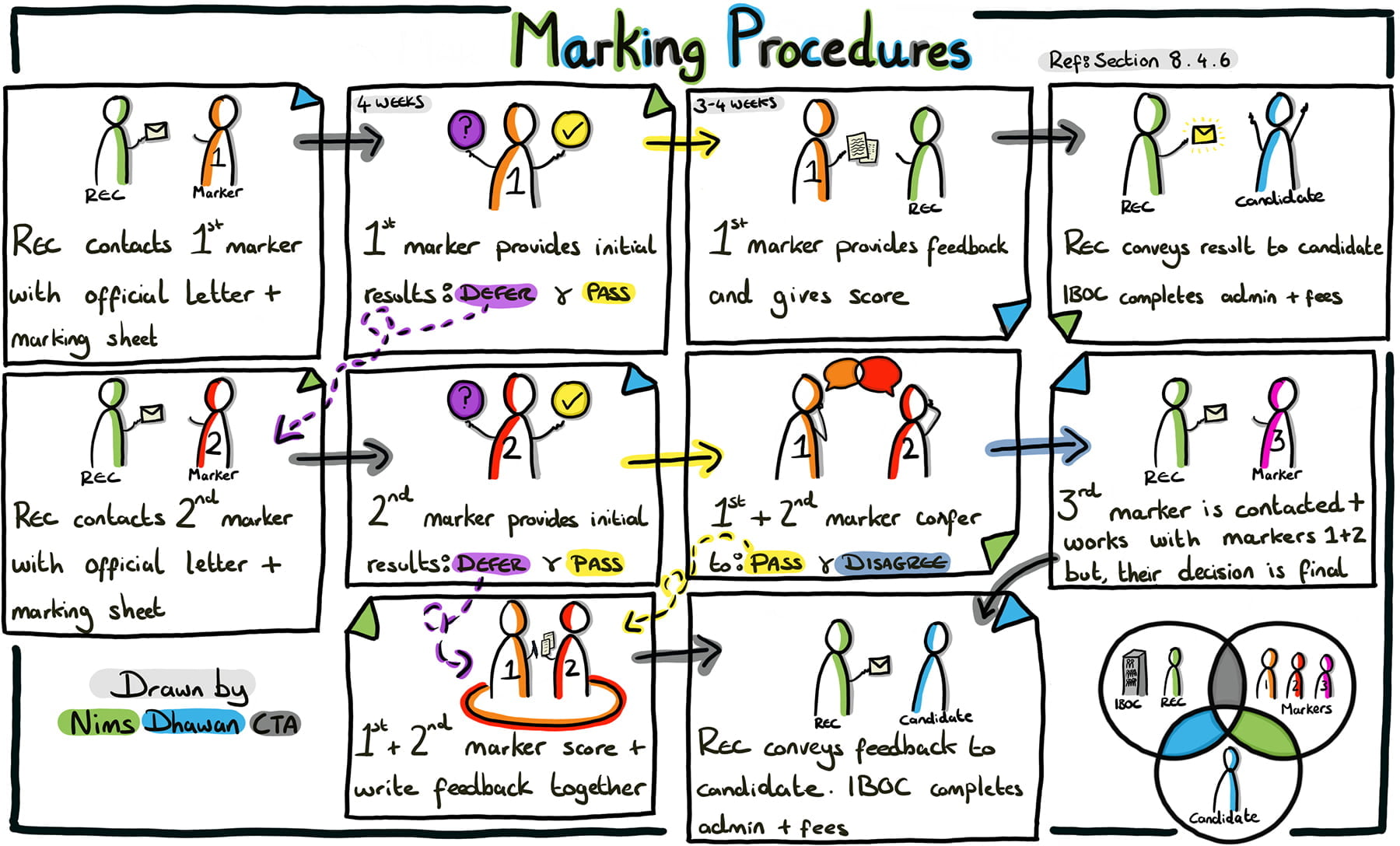Certified Transactional Analyst (CTA) Training
The first step in training as a CTA is to sign a contract with your principal supervisor (CTA Contract Form 12.6.1). This contract is valid for 5 years. The next step is to complete the CTA exam.
The CTA exam consists of a Written Exam and an Oral Exam. One can only take the oral exam once the written exam has been successfully completed. For all details on CTA exams see the IBOC Handbook, sections 7, 8 and 9 and discuss your plan and wishes with your principal supervisor.
The written exam is a case study that describes a piece of work in your chosen field. It can be up to 24,000 words and also includes a professional self-portrayal and discussion of personal learning in training. It should reflect the candidate’s main area of work and be typical of their professional application of TA.
Having passed the written exam, candidates then are eligible to take the oral exam. The oral exam involves presenting your work in TA, using recordings of work with individuals and groups. Oral exams take place several times each year online and in person.
Fields of Specialization in Transactional Analysis
See Handbook Section 5 for complete description of specialization fields in TA.
Transactional Analysis Counseling is a professional activity within a contractual relationship. The counseling process enables clients or client systems to develop awareness, options and skills for problem management and personal development in daily life through the enhancement of their strengths, resources and functioning. Its aim is to increase autonomy in relation to their social, professional and cultural environment. The field of counseling is chosen by those professionals who work in the socio/psychological and cultural fields of practice. Some examples amongst others are: social welfare, health care, pastoral work, prevention, mediation, process facilitation, multicultural work and humanitarian activities.
The Education field of specialization is for practitioners who work in the area of learning and study in pre-school, school, university and post university contexts or for the support of child, adolescent and adult learners within the family, the institution or society. The work may be applied to the development of teaching teams and institutions. The aim is to further personal and professional growth, both scholastic and social. TA can be used as a practical educational psychology that offers a way of transforming educational philosophy and principles into everyday practice. Educational TA is both preventive and restorative. The aim is to increase personal autonomy, to support people in developing their own personal and professional philosophies and to enable optimum psychological health and growth.
The Organization field of specialization is for practitioners who work in or for organizations, taking into account organizational frames of reference and contexts as well as the organization’s development. Their work is aimed at the development, growth and increased effectiveness of people working within organizations. Transactional Analysis is a powerful tool in the hands of organizational development specialists. Through presenting the basic concepts of transactional analysis and using it as the basic theory to undergird the objectives of their clients, organizational development specialists build a common strategy with which to address the particular needs of organizations and to build a functional relationship, as well as eliminate dysfunctional organizational behaviors.
The Psychotherapy field of specialization is for practitioners who aim to facilitate the client’s capacity for self-actualization, healing and change. The psychotherapeutic process enables the client to recognize and change archaic, self-limiting patterns – ‘to deal with the pain of the past in the present so that they are free to live their lives in the future’. The aim is for clients to understand themselves and their relationships and create options to live their lives in an aware, creative, spontaneous way and open to intimacy. There may be national legal restrictions on who can practice as a psychotherapist, and it is important that trainees discuss these with their Principal Supervisor when choosing this field of specialization.
A task force from each field has drawn up a set of core competencies, which articulate the knowledge, attitudes and skills expected from a certified transactional analyst in that field. The candidate is expected to acquire the core competencies for the specified field. Core competencies for the four fields of application are described in Handbook Section 5.
Apply to Become a Contractual Trainee
How To Register
The International Board of Certification (IBOC) manages all training contracts, Training Endorsement Workshops (TEWs), and exams. The standards and guidelines for training toward certification as a practicing, supervising, or teaching transactional analyst have been established by the Professional Standards Committee (PSC) of the ITAA in cooperation with the European Association of Transactional Analysis (EATA). These training standards have been agreed upon worldwide and are mutually recognized by many regional TA associations.
Inquiries
PSC establishes the training standards, the ITAA Code of ethics, and the Professional Practices Guidelines.
psc_co-chair1@itaaworld.com or psc_co-chair2@itaaworld.com
IBOC manages all training contracts, Training Endorsement Workshops (TEWs), and exams.
iboc_admin@itaaworld.com
IBOC is in the process of making its forms digital. You can now apply for a CTA contract and submit your CTA written exam via the hyperlinks below. Payment will be taken through this online application process.
All other applications currently need to be submitted via email to the IBOC administrator at iboc_admin@itaaworld.com using the relevant forms. IBOC will then raise an invoice for payment as needed.
01.
CTA Online Application for All Fields: REGISTER HERE.
CTA Written Exam Online Application for All Fields: REGISTER HERE.
TSTA Application: Download and complete TSTA Application Form.
(Email all IBOC completed Application Forms to: iboc_admin@itaaworld.com)
02.
Once IBOC has received your application, we will send you an invoice via email with instructions for making payment, after which we can process your contract or application. You may check your fee structure here. See the list of countries eligible for discounted fees under the TAlent Program.
NOTES:
The fees shown are for the CTA and TSTA exams are for the online exams. Fees will be higher for onsite exam.
To make training toward TA certification more widely accessible, the ITAA offers the TAlent Program and the Scholarship Grant Fund to qualified ITAA members. For grants for training, conference attendance, or other uses, applicants must complete the GENERAL Scholarship Grant Application.
03.
Upon receiving your payment, you will be notified via email regarding your training program. There will be administrative documents to be submitted to IBOC at each task of your training. See handbook for detailed information.
IBOC CTA exam candidates must submit the written case study no later than SIX months before the oral exam date.
Exams subject to availability of qualified examiners/exam supervisors who must be at least a CTA (for a CTA exam) or a TSTA (for a TSTA exam). The IBOC is not responsible for expenses incurred when exams are canceled or postponed due to unavailability of qualified examiners/exam supervisors.
CTA Examinations Process
See Handbook Section 7 for overview on CTA Examinations.
The written exam (case study) describes a piece of work in your chosen field, and includes TA and other theory. It can be up to 24,000 words, and also includes a professional self-portrayal and discussion of personal learning in training. It should reflect the candidate’s main area of work and be typical of their professional application of TA. Examples: a TA based training course; interventions for organizational change; teaching TA to students, youth workers or parent educators; working with a single therapy client, a counseling client, or client group.
Marking of the CTA Written Exam
For the marking procedure of the written exam see Handbook Section 8.4.6.

Having passed the written exam, you then take the oral exam which involves presenting your work in TA, using recordings of work with individuals and groups. To prepare for this, it is a good idea to begin recording yourself working as early in training as you can — listening to recordings and discussing them with your primary supervisor and with co-trainees is a very effective learning process! Oral exams take place several times each year online and in person.
Timetable for CTA Examinations
| 12 months before: | With the CTA Training Contract filed and endorsed by IBOC, candidate decides on oral examination venue and begins written examination. |
| 12 months before: | Candidate informs the regional IBOC examination coordinator of the intention to submit his/her written exam. |
| 6 months before: | Candidate pays to the IBOC Office the CTA written examination filing fee. Candidate sends to the IBOC Office the following: • the written examination in electronic form, • the supervisor’s endorsement of written examination form, and • the candidate’s submission of written examination form.3 months before: |
| 3 months before: | Candidate should have received written examination evaluation. |
| 3 months before: | Candidate registers for oral examination by sending to the IBOC Office: the Supervisor’s Endorsement for CTA Oral Examination Form (12.7.3), the Application for the CTA Oral Examination Form (12.7.4), and the oral examination fee. |
| 2 months before: | Candidate is sent Acknowledgement of the Documents-Received Checklist (12.7.5). This is the last point at which the candidate can withdraw from the oral examination without forfeiting the examination fee. Candidates are advised to keep copies of all relevant documentation submitted. |
CONTRACTS via Online
WRITTEN EXAMS
*These forms are now created during your online registration. These PDF files are for reference only.
CTA examination documentation:
Supervisor’s Endorsement of the CTA Written Examination (12.7.1)
Candidate’s Submission of the CTA Written Examination (12.7.2)
Supervisor’s Endorsement of the Candidate for CTA Oral Examination (12.7.3)
Application for the CTA Oral Examination (12.7.4)
Acknowledgement of Items Received for CTA Examination (12.7.5)
Letter to Assessor of the CTA Written Examination (12.7.6)
Written Examination Scoring Scale (12.7.7)
Letter sent with Assessment(s) of CTA Written Examination (Pass) (12.7.8-a)
Letter sent with Assessment(s) of CTA Written Examination (Deferral) (12.7.8-b)
Oral Examination CTA Counselling Scoring Sheet (12.7.9)
Oral Examination CTA Education Scoring Sheet (12.7.10)
Oral Examination CTA Organizations Scoring Sheet (12.7.11)
Oral Examination CTA Psychotherapy Scoring Sheet (12.7.12)
Examiner Evaluation Form (12.7.13)
Examination Supervisor’s Report (12.7.14)
